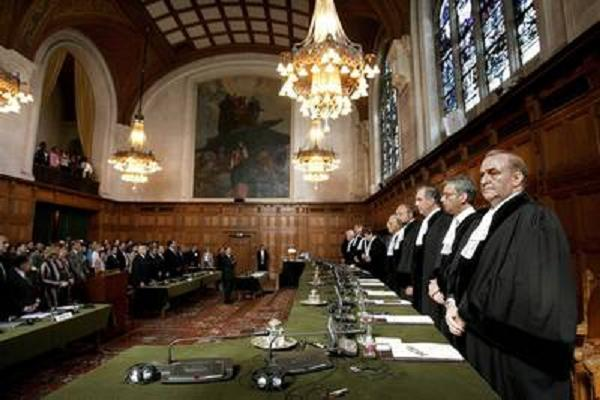 20 July 2009 The Hague Tribunal sentences Milan Lukic to life in prison for crimes committed in Visegrad, and his cousin Sredoje to 30 years.
20 July 2009 The Hague Tribunal sentences Milan Lukic to life in prison for crimes committed in Visegrad, and his cousin Sredoje to 30 years.
In a first-instance verdict handed down by the Hague Tribunal, Milan and Sredoje Lukic have been found guilty of numerous crimes committed in the Visegrad area between 1992 and 1994. They have been sentenced to life in prison and 30 years respectively.
The indictment charged that Milan Lukic was Commander of the “Beli orlovi” (“White Eagles”) or “Osvetnici” (“Avengers”) local paramilitary group, consisting of Bosnian Serbs, in Visegrad. Sredoje Lukic was a “member of a local paramilitary group”, who worked as a policeman in Visegrad prior to the war and during the course of the war.
“The fires in Pionirska Street and in Bikavac are the worst examples of inhumane acts that a person has perpetrated against other people over the course of a long and cheerless history. At the end of the 20th century these horrible events stand out because of the awful inferno, the obvious existence of forethought and intent, the sheer impudence and brutality in locking civilians in a house and then exposing the innocent victims to the hellish fire that followed,” said Judge Patrick Robinson, explaining the decision.
The Chamber determined that a group of about 70 Bosniak civilians were brought to a house in Pionirska Street, where they were “robbed while being threatened by armed men”. After that they were taken to another house and locked in a room on the ground floor. “The evidence indicates”, the chamber said, that inflammable liquid was poured on the carpet of the room. After that an explosive device was thrown into it, causing a huge fire, which killed 59 people.
“The evidence shows that Milan Lukic closed the door once the group of people were taken into the room. He was the one who placed the explosive device in the room, setting the house on fire. The Trial Chamber has determined that he shot at the house windows, wounding the surviving witnesses, while they were trying to escape,” Judge Robinson said.
Speaking about the guilt of Sredoje Lukic, the Chamber determined that, “despite the fact that there is no reliable evidence to prove that he set the house on fire or shot at the windows”, he still “contributed to a significant extent” to the death of 59 people “by being present and armed”, thus “supporting the cruel behaviour and inhumane acts”.
The indictment charged that 17 children below the age of 14 were among the victims who were killed in the fire in Adem Omeragic’s house in Pionirska Street.
Explaining the count charging the Lukic cousins with burning alive about 70 people in a house on Bikavac hill, the Trial Chamber decided to accept the statement given by Zehra Turijacanin, the only survivor, determining that she was “a witness to truth”.
“Zehra Turijacanin is a sad and tragic, but, at the same time, a heroic person… Witnesses vividly remember the horrible screams coming from the house, which sounded like a cat yowling. The Trial Chamber determined that at least 60 civilians were set on fire alive on this occasion,” Robinson said.
“Milan Lukic played a dominant role in the events that took place in Pionirska Street and on Bikavac hill,” the Chamber ruled.
The Lukic cousins were also found guilty of beating up male detainees in Uzamnica detention camp, in Visegrad Municipality, from August 1992 to October 1994.
“The evidence shows that both men visited the detention camp, although Sredoje visited it less frequently than Milan. When they were present in the detention camp, the two men brutally and repeatedly beat up and hit the detainees with their feet, fists, sticks and the butt of guns,” Robinson said.
Under the Trial Chamber’s verdict, Milan Lukic was found guilty of having murdered several people by the Drina river and in the Varda furniture factory.
“Milan Lukic ignored the victims when they begged him not to kill them. Instead, he ordered the soldiers to shoot them,” the Chamber determined.
The Trial Chamber said that the alibis offered by Lukic’s Defence teams were “cynically and insensibly created entities”, determining that the Prosecution had managed to prove the indictees’ guilt beyond reasonable doubt.
“The Chamber further determined that Milan Lukic personally killed at least 132 Muslims… He committed the cold-blooded murder of Hajra Koric in a precocious and neglectful manner. (…) He laughed when he turned her body with his foot and fired a bullet in her back,” the Court said.
The Trial Chamber said that “many pieces of evidence” pertaining to other crimes were presented during the course of this trial. The other crimes include “murder, rape and beating”. However, “considering the fact that the Lukic cousins were not indicted for those crimes, the Chamber did not determine their guilt for them”.
Victims from Visegrad have protested for years because the Hague Prosecution did not include numerous cases of rape committed in Visegrad, including those committed in Vilina vlas spa, in the indictment against Milan Lukic. (See: Visegrad Rape Victims Says Teir Crie Go Unheard).
In a UN report on rape committed in Bosnia and Herzegovina, compiled in 1994, Vilina vlas is mentioned as one of the locations where rapes were committed. It was mentioned as a detention center in which girls less than 14 years old were held, among others.
The trial of Milan and Sredoje Lukic is the last taking place before the Tribunal involving direct perpetrators.
“In its past work the Hague Prosecution has not identified one single paramilitary leader whose level of responsibility or gravity of crime correspond to the ones mentioned in the case against Milan Lukic” , concluded ICTY before this trial.
BIRN
